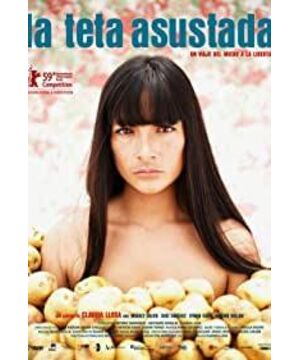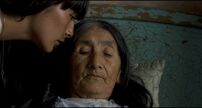It seems that most of the students who watched this film did not understand it too well, perhaps because of the subtitle translation. I was watching the English subtitles on the original DVD, and it is estimated that the accuracy will be slightly higher. So, let me explain. "Milk of Sorrow" (milk of sadness), the profile on IMDB says that it is a rare disease that is only found in women who have been violent/raped and contracted through breast milk. From my general medical knowledge, it feels like a disease name created by the director to express a certain meaning. The film mainly analyzes the psychological trauma of raped women and the impact on later life. The mother of the heroine Fausta has suffered great psychological trauma. It can be analyzed from the lyrics of the heroine's mother at the beginning of the film. During the mother's pregnancy, her husband was killed, raped, and forced to eat her husband's genitals. So, Fausta, the heroine, was infected with the "Milk of Sorrow" disease through her mother's milk. The symptoms of this disease are long-term inexplicable fear, and sometimes confused thinking. Due to her mother's ideological indoctrination, the heroine has always believed that putting a potato in her lower body is the most effective way to avoid being raped. The doctor told her that "potatoes may sprout and take root in her lower body". Her uncle also persuaded her that today's society is not as lawless as it used to be, and the streets will not be full of rapists. But she was very stubborn and did not listen to their advice. The heroine has an inexplicable fear of all the strange men around her, and she never dared to go out on the street alone. After the heroine's mother died, she promised her uncle to use her own money to bring her mother's body back to her hometown in the countryside for burial. After her mother's body was washed, waxed and mummified, it was temporarily placed at home. Uncle reminded her not to delay too long, otherwise, he would burn the body. In order to earn enough travel/transportation expenses as soon as possible, she found a second part-time job as a maid for a wealthy white family. The main job of the heroine is to help her uncle's wedding company as a handyman. The heroine met Noe, a gardener at the employer's house. Since both of them were sensitive to plants, they had more opportunities to contact each other, and they developed feelings for each other. Under the background of many folk-style weddings, the heroine is gradually unable to hold back her heart. With a red flower in his mouth, he deliberately dropped in front of Noe, shyly seducing Noe, the gardener. Facing Noe's love, the heroine's psychological struggle at this time, all kinds of contradictions piled up, making her even more at a loss. After collapsing, she wakes up to see Noe, crying and begging to "remove the potato from her body".
The heroine's uncle may be the only man she trusts. After her nephew's wedding banquet, when everyone was asleep in the middle of the night, her uncle grabbed her neck, trying to use a brief suffocation to awaken (activate) her confidence in returning to a normal life. Of course, the heroine could easily mistake it for rape, so she ran away in a panic. And the uncle has not been able to explain in time, the purpose of this is to hope that she should get out of the shadow of fear. So after she escaped, her uncle cried instead and said something, I forgot. After that, how do they resolve this question? The film doesn't say that the family relationship doesn't seem to have any impact. The heroine knows that her uncle can't do such a thing. Maybe she forgave her uncle's behavior? This is my personal interpretation. The employer is a wealthy family, descended from the Spanish colonists, and has the atmosphere of aristocratic elegance. What impressed me more was the first time the heroine saw the picture of the male host's uniform on the wall. Although it was a blurry image, the bright saber marked his status as a ruling class, and he was probably a senior general of the army. In Peruvian society, the gap between the rich and the poor and the difference in life between the toilers of Indian descent and the wealthy colonial ruling class is also one of the big backgrounds reflected in the film. The hostess asked the maid (the hostess) to sing a folk song, copied (copied) these folk songs, and rewarded the hostess with a pearl each time. The metaphor alludes to the morality and dishonesty of the colonial elite.
"Background":
Her mother was raped during the period from 1980 to 1992 during the internal armed struggle in Peru. Before the 1980s, there were many military coups in Peru, and the military government tried to reorganize the economy many times, but it always failed. Bleaunde, who ran for office in 1980, has lived in the United States for more than 10 years. At that time, Latin American countries were in the midst of a communist revolutionary struggle. The newly established Communist Party of Peru, "Shining Path", is more extreme and uses guerrilla means to try to overthrow the government in power. The Peruvian army and regional security forces often enter the mountains to clear and suppress. At that time, the government army used extremely terrifying and cruel methods to suppress the pro-Communist villages and towns. Rape has also become a common intimidation method. The book "Entre Prójimos", which is based on the film, has the victim's complaint and was gang-raped by 30 people. Wait. The heroine is actually the second generation of the direct victim, and still suffers from the trauma of her mother, but the pot of potato flowers sent by the gardener at the end of the film, the heroine's smile, heralds the beginning of a happy life for the heroine in the future.
The full title of the book : "Entre Prójimos: El Conflicto Armado Interno y la Política de la Reconciliación en el Perú" (English translation "Among Neighbors: The Internal Armed Conflict and the Politics of Reconciliation in Peru") . The film has many scenes that are very rich Poetic and meaningful, the original soundtrack is also very successful, the characters in the film are very close to reality, and the performances of all the actors are very real, without the slightest contrived and commercial spirit, it is really a rare masterpiece.
View more about La teta asustada reviews









